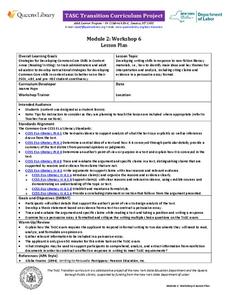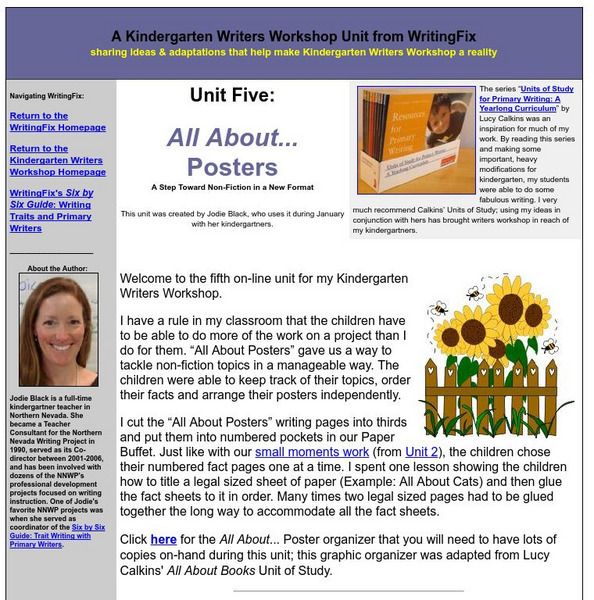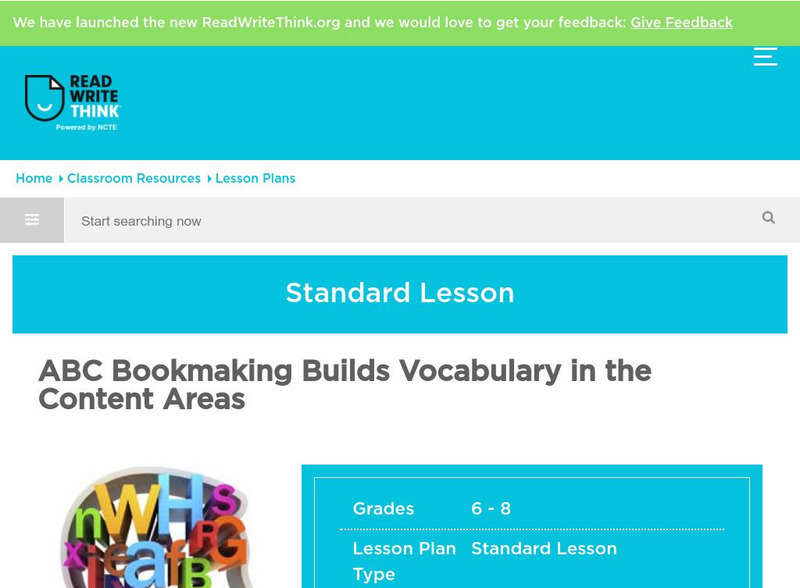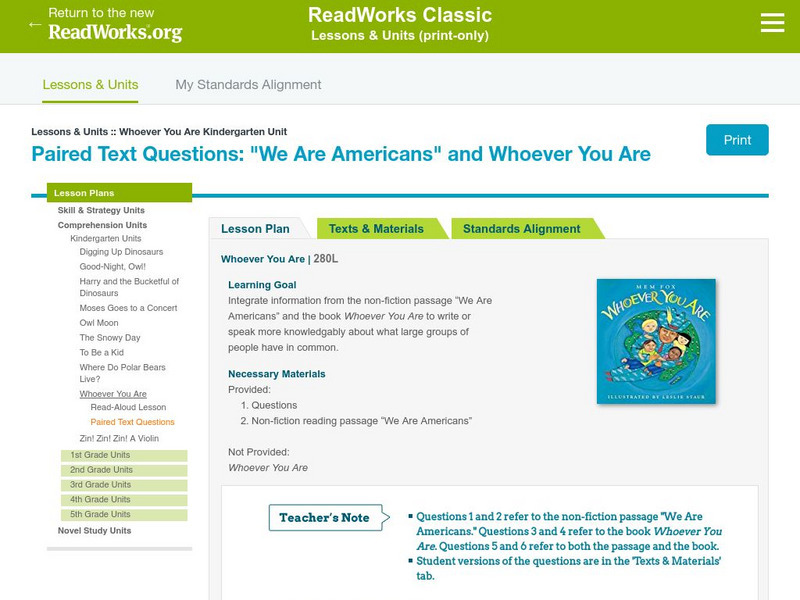EngageNY
TASC Transition Curriculum: Workshop 6
Is a college education necessary for success in today's world? The class investigates the question, along with others at the end of the sixth workshop in a 15-part series. The lesson has four parts with multiple activities and...
EngageNY
TASC Transition Curriculum: Workshop 12
How can opinions slant facts? Workshop participants learn how to examine primary and secondary sources and identify the author's point of view. They also examine how visual art impacts the meaning and rhetoric of sources. Full of...
New York State Education Department
TASC Transition Curriculum: Workshop 5
Are video games sports? Pupils investigate this question as well as various nonfiction selections to learn more about claims and the support that defines them. All of the selections mimic the rigor on state tests and encourage close...
National Endowment for the Humanities
Neh: Edsit Ement: Introducing the Essay: Twain, Douglass and American Non Fiction
This lesson plan serves as an introduction to American literary non-fiction writing and focuses primarily on teaching some basic approaches to recognizing rhetorical strategies adopted for persuasive effect in essays and non-fiction. The...
ReadWriteThink
Read Write Think: Diagram It! Identifying, Comparing & Writing About Non Fiction
Introduce your students to the different types of non-fiction such as biographies, biographies, and informative books. Students will use graphic organizers, peer interaction, and hands-on experiences to further understanding of this lesson.
Better Lesson
Better Lesson: Bats, Friend or Foe. An Argument Writing Activity
Students will state an argument with evidence, for or against, bats being removed from their environment by writing a letter to the editor and citing evidence for your claim.
Better Lesson
Better Lesson: A Storm of Ideas
The first step in writing an informational text on the topic of learners' choice is helping the student choose a topic of interest. Students will brainstorm ideas that will be possible final topics.
Scholastic
Scholastic: Nonfiction Writing Lessons
This series of nonfiction writing lessons was developed by Stuart Miller. Four activities include: Describing the Real World, The Interview, Writing a Profile, and Writing a Review.
Better Lesson
Better Lesson: What Did Jimmy's Boa Eat? 1 of 2
In this lesson, students will write an informational paper by comparing fictional text and a non fiction text about boa constrictors.
Writing Fix
Writing Fix: All About Posters
As young writers become more skilled through the Writers Workshop lessons, they can begin working to become more skilled with non-fiction writing. A series of mini-lessons, graphic organizers, and samples of student work are all provided.
Read Works
Read Works: Fourth Grade: Three Lesson Unit: Compare and Contrast
[Free Registration/Login Required] A three-lesson unit on comparing and contrasting through which learners compare and contrast two non-fiction articles and two editorials, and write a compare and contrast essay. With free login, users...
ReadWriteThink
Read Write Think: Question and Answer Books From Genre Study to Report Writing
Contains plans for eight lessons that explore Question and Answer Books and ask students to do research in order to write their own. In addition to objectives and standards, these instructional plans contain links to sites used in the...
TES Global
Tes: Non Fiction Unit 4 Formal/impersonal Writing: Tourists
[Free Registration/Login Required] Learners will analyze tourism brochures to determine features related to nonfiction writing in this unit. Tourism websites may be used in lieu of the brochures. Cotswold and the North Leigh Roman Villa...
ReadWriteThink
Read Write Think: Abc Bookmaking Builds Vocabulary in the Content Areas
Six 50-minute lessons build vocabulary through the content areas by making an ABC book. It can become a classroom resource. Links include a non-fiction book list, checklist, word list, rubric, and a storyboard chart. There is also a link...
Texas Education Agency
Texas Gateway: Hyperbole and Understatement (English Ii Reading)
[Accessible by TX Educators. Free Registration/Login Required] In this lesson, you will learn to recognize hyperbole and understatement in nonfiction. Good examples also appear in other forms of writing such as fiction and poetry, but we...
CommonLit
Common Lit: Units: Teaching Units
Complete teaching units (12) by grade level. CommonLit units are crafted to be both engaging and rigorous, featuring a variety of literary and informational texts from diverse sources. Reading, writing, and discussion are prioritized in...
Other
Literature Unit: "A Day No Pigs Would Die"
This site features questions for each of the chapters in Robert Newton Peck's "A Day No Pigs Would Die."
Read Works
Read Works: Paired Text Questions: "We Are Americans" and "Whoever You Are"
Students will compare information from the non-fiction book "We are Americans" and the book "Whoever You Are" to write or speak more knowledgeably about what large groups of people have in common.

















